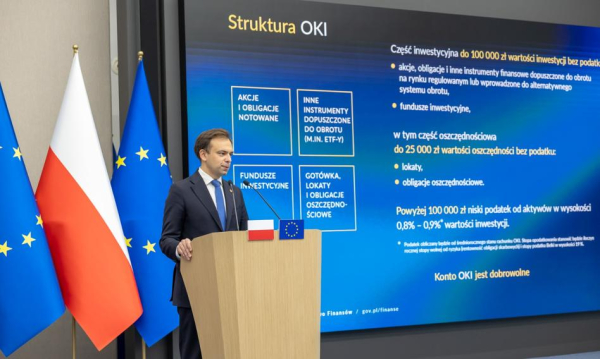There’s no guarantee of success for savers, whether personal investment accounts will be a more advantageous solution than standard capital gains tax, or for the economy, whether they will gain mass popularity, stimulating investment and savings accumulation. However, OKI offers a real opportunity, as the example of Sweden demonstrates,” Michał Szymański, CEO of VIG / C-Quadrat TFI, points out in a commentary for Bankier.pl.

A proven example from Sweden
The Personal Investment Account (OKI) is, in my opinion, an interesting initiative that offers the opportunity to encourage society to save more effectively. This type of account, known as the ISK , has been operating in Sweden for over 10 years, allowing for a thorough assessment of its strengths and weaknesses. Its introduction was designed to facilitate investment for a broad range of social groups – including stocks, corporate bonds, and investment funds. This entirely voluntary structure has proven to be a major success – nearly 50% of Swedish citizens over the age of 20 have such an account.
Savings activation is important both for savers and the economy. Saving money in current accounts doesn’t even protect against inflation, as the example of Poland also demonstrates. According to NBP data, between 2020 and 2024, the cumulative rate of return on “current deposits,” which constitute the vast majority of deposits, was less than 6% over five years. During the same period, cumulative inflation exceeded 40%.


Michał Szymański, president of VIG / C-Quadrat TFI (Press materials)
From an economic perspective, investing in business development supports its growth and innovation. Such investments can be made directly through stocks, bonds, or investment funds. This is particularly important in Poland, where the rate of private company investment relative to GDP has been steadily declining for almost 10 years and is currently one of the lowest in Europe. In the long term, such a situation typically leads to a slowdown in economic growth.
Advertisement See also: Awaken your inner stock market bull! With us, it costs nothing to go overboard.
When an asset tax can be beneficial
One important factor in the popularity of a solution like OKI is its simple, relatively low taxation. Asset tax is easy to calculate and understand. Its amount is always subjective.

For example, in Sweden, for a similar ISK account, the tax rate was around 0.5% for a long time, and recently increased to around 1%. To make it easier for savers, the tax should be calculated by the institution running the OKI.
The advantage of the asset value tax is its simplicity and its more favorable position for higher-yielding investments. This solution favors longer-term investments with higher potential returns, such as investments in stocks, corporate bonds, and even private equity.
The risk of this tax solution is the need to pay tax even if the investment generates a loss – which is why long-term investments are more advantageous. Those for whom this tax risk is too high will have a choice – they can maintain the current taxation regime, i.e., capital gains tax at 19%. The introduction of the OKI account will give savers much more choice in managing their investments.
Introducing a tax on amounts above 100,000 złoty is rational. It’s difficult to imagine accepting a solution where a person holding shares worth several or even hundreds of millions of złoty would be exempt from tax.
A chance to stimulate investment
The range of available deposits within an OKI account should be as broad as possible to support the diversity of the capital market, which is its essence. However, I understand the caution in allowing a situation where a person invests funds in a bank deposit with an annual interest rate of 0.5% while paying tax, for example, 0.8% on assets – such a deposit would be a guaranteed loss. Another example would be the types of deposits where, according to publications by the Polish Financial Supervision Authority, up to 70% of customers regularly incur losses every year – this does not build savings or stimulate the national economy, and the asset value tax would further disadvantage investors.
The advantage of an OKI account is its complete voluntary nature and investment flexibility. It should be possible to deposit funds in any way and withdraw them freely at any time. A simple, low tax rate, calculated by the institution managing the OKI, is intended to facilitate investments. Individual Pension Accounts (IKE), Individual Pension Security Accounts (IKZE), and Employee Capital Plans (PPK) offer tax benefits, but these are generally related to maintaining funds until retirement age, and therefore have slightly different goals and associated limitations.
No structure guarantees success, and neither does the OKI. Neither does it guarantee savers’ benefits over standard capital gains tax, nor does it guarantee the economy’s mass adoption of accounts, stimulating investment and savings accumulation. However, the OKI account offers a real opportunity, as demonstrated by the example of Sweden, where such a solution has proven highly successful.
The government invented the Personal Investment Account. What is it all about?
Finance Minister Andrzej Domański presented the principles of a new savings product that allows people to avoid the Belka tax up to 100,000 złoty. He also officially withdrew plans to reduce the capital gains tax.
Personal Investment Account (OKI), which will allow you to avoid the Belka tax on amounts below PLN 100,000. But there’s one important catch: assets accumulated in the OKI exceeding PLN 100,000 will be subject to a 0.8-0.9% tax on their value each year .
read more »
Michał Szymański, president of VIG / C-Quadrat TFI